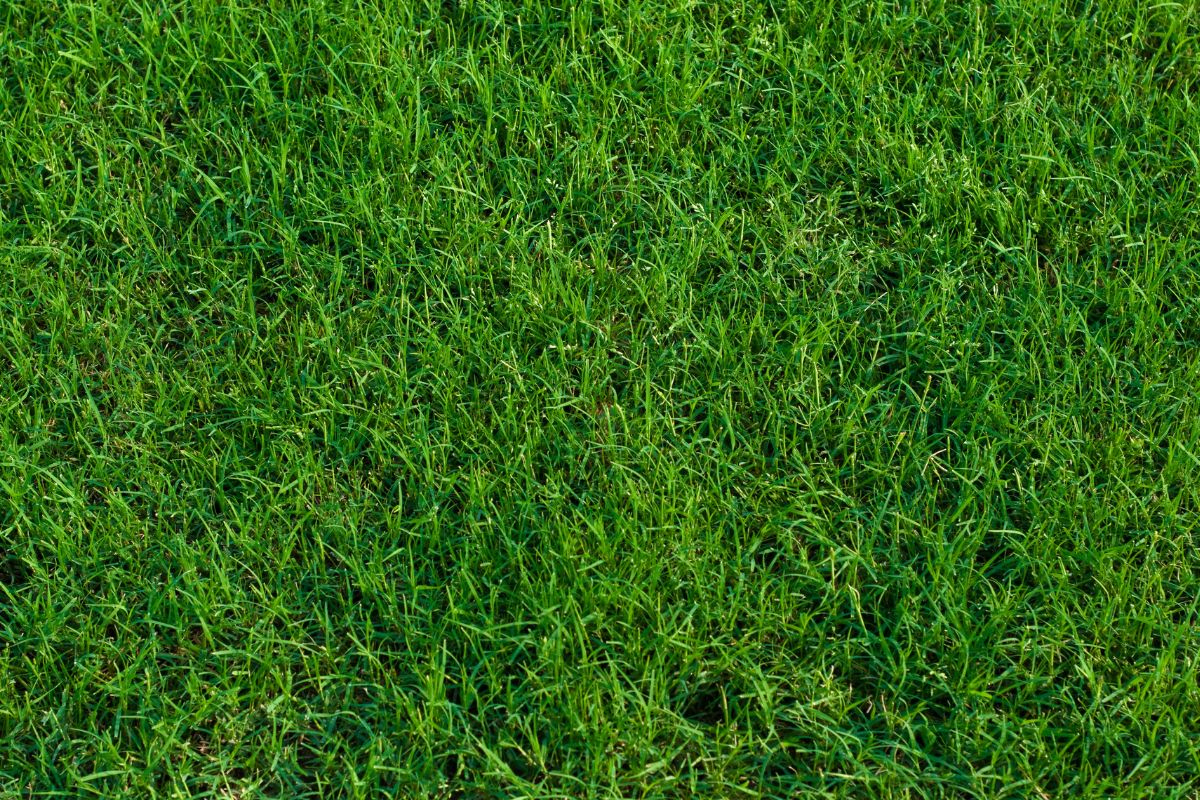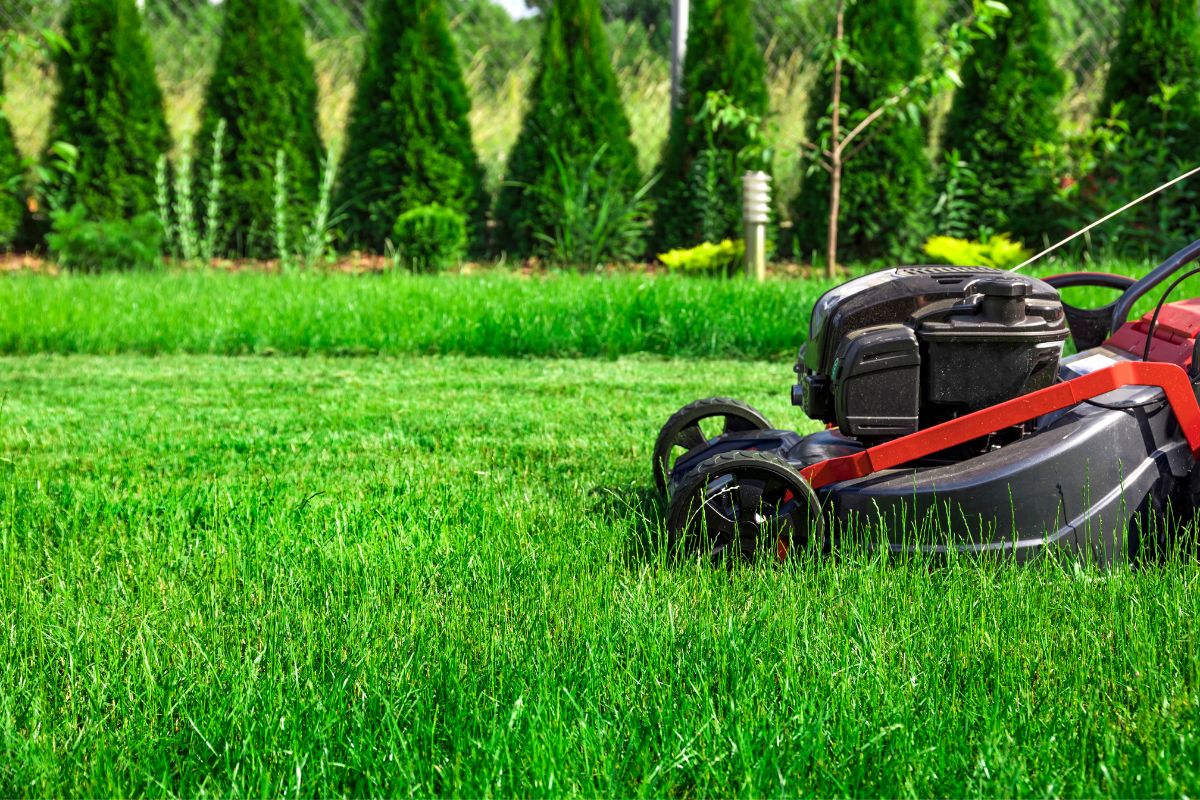Depending on the temperature and soil PH, golf courses utilize a range of grasses.
Bermuda grass is one of the most frequent varieties of grass cultivated on golf courses across America.

In many places, Bermuda grass is also a good choice for a private lawn.
Bermuda grass grows in bunches and has a robust root system.
To create the greatest greens and fairways, the grass might be mowed short. Bermuda grass may also be used to produce golf course rough.
Here is what you should know about Bermuda grass including how you can make it thicker.
What Is Bermuda Grass?
Bermuda grass, or “Bermuda” for short, is a species of turfgrass commonly used on golf courses.
It is a warm-season grass that is utilized in warm-weather golf destinations like Florida and Georgia.
Bermuda grass is drought tolerant, heat resistant, and may be cut short.
Bermuda grasses tend to die in colder weather and may need to be overseeded with perennial ryegrass to fill up gaps.
Augusta National’s tees and fairways are made of Bermuda grass.
Why Is Bermuda Grass Used in Golf?
Due to it being so popular on golf courses and playing fields in the South, as well as its ability to survive high levels of humidity, high temperatures, and droughts, Bermuda grass is sometimes referred to as “The Sport Grass of the South.”
It is a fast-growing, resilient grass that is ideal for golf courses and athletic greens. It’s a tough grass that can withstand a lot of traffic and punishment from golfers.
Bermuda grass is also a fantastic choice for golf greens and fairways because it grows quickly and is mowed six days a week to maintain a consistent grass surface.
Golf greens are also fertilized on a regular basis, and pest and disease management are also performed frequently which allows for Bermuda grass to thrive.
What Is It Like Playing Golf on Bermuda Grass?
The type of grass used on a golf course has an impact on how the game is played.
Some golfers are accustomed to playing on various types of grass, such as Bent Grass.
On Bent grass, the golf ball can roll in a fairly straight line. Bermuda grass differs differently and can affect how the golf ball rolls.
The Bermuda grass grain affects how well the ball rolls. The ball on a Bermuda golf course tends to break in the direction that the grass grain develops.
Before you begin playing, determine which way the grain of the grass is growing.
This may be accomplished simply observing the color of the grass. If it seems dull or dark green, the grain is most likely toward you.
If, on the other hand, the grass seems bright green and lustrous, it is growing away from you.
To get an uphill putt into the hole on Bermuda grass, you may need to hit it somewhat harder than you would on other varieties of grass.
If you’re putting into Bermuda grass, you might have to hammer the ball into the hole.
When putting downhill with the grain, you may see that the golf ball moves more faster than you expected.
How to Make Bermuda Grass Thicker?
Mow Lower

The ideal height for Bermuda grass to encourage dense growth is around 0.75 inches. Set your mower blade at this height to cut the grass.
Mowing Bermuda grass once a week to less than one inch in height encourages Bermuda grass to grow horizontally along the ground rather than vertically, resulting in a bigger lawn.
Simply increasing the height of your mowing may transform a spotty Bermuda grass into a lush paradise.
Stay On Top of Weeds
Like all grass types – Bermuda grass will struggle to grow if it is being choked by weeds.
This is why it is important that you stay on top of weeds by using things such as herbicide to kill the weeds.
Keep in mind that you do not have to wait until you see weeds appear before you start taking steps with getting rid of them.
Using a herbicide will prevent the weeds from coming up and choking your grass.
Fill in the Thin Spots
Fill up dry places and regions where the turf is sparse by overseeding a thin Bermuda grass lawn.
Spreading grass seed over an existing lawn in the autumn is the greatest time to maintain its thickness before the busy growth season of spring.
Water Once a Week
Drought stress frequently results in a thin bermudagrass lawn.
If your grass does not receive at least one inch of water every week throughout the spring and summer months, it will grow slowly and spread poorly.
To encourage Bermuda grass thickening, irrigate at least one inch each week to promote root development and lateral growth of grass stolons.
Proper watering encourages deeper root growth, better nutrient absorption, and, eventually, a lush Bermuda grass lawn.
Apply a Fertilizer
If your Bermuda grass is looking a little thin, a little fertilizer can be just what it needs to bulk up.
Fertilizing your lawn at least a few times every season will help it grow. It can even help to prevent lawn diseases and weeds.
A thicker grass will also be able to survive periods of drought more easily. Giving your grass a fertilizer boost is quite likely to have great outcomes.
Reduce Shade
Bermuda grass is not shade tolerant. In reality, most grass requires at least six hours of direct sunlight every day.
Consider trimming trees along the edge of your lawn to help it grow. Remove any umbrellas or outdoor furniture that may be obstructing sunlight.
Aerate
Bermuda grass is very vulnerable to compacted soils.
Your grass will be unable to extract necessary nutrients or water if the soil is excessively hard, resulting in an uneven or sparse lawn.
Bermuda grass lawns benefit greatly from aeration.
Once the soil has been aerated, oxygen, water, and nutrients will be able to penetrate the topsoil and nourish your grass much more easily.
Summary
Bermuda grass is a common feature on golf courses because it can put up with prolonged high temperatures and environments similar to drought.
Bermuda grass can also withstand a lot of wear and tear from golfers and creates a good foundation for golfing altogether.
For Bermuda grass to be the best that it can be, it is important that you carry out the necessary practices when it comes to mowing, watering, and fertilizing.
The ideal height for Bermuda grass is about 0.75 inches in height.
- Can You Bring Your Own Clubs To Topgolf? - November 15, 2022
- How Wide Is A Golf Cart? - November 15, 2022
- How Long Does 9 Holes Of Golf Take? - November 15, 2022
